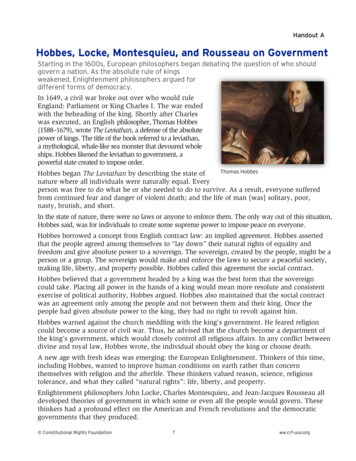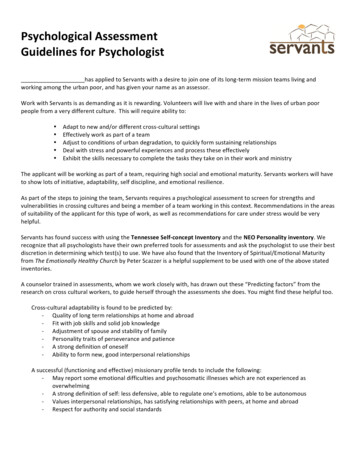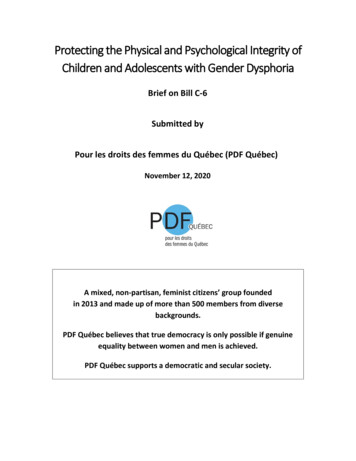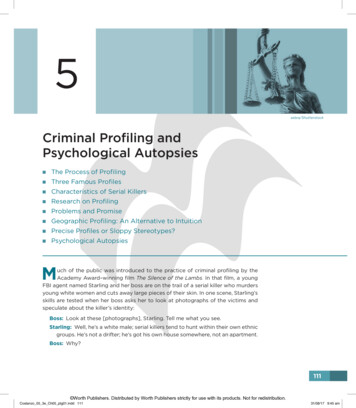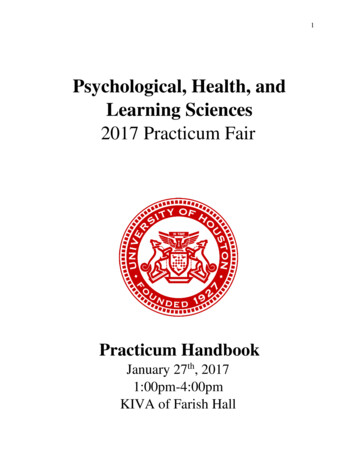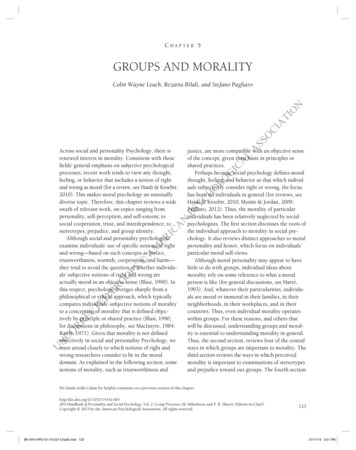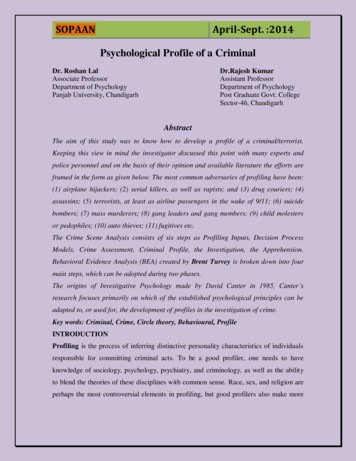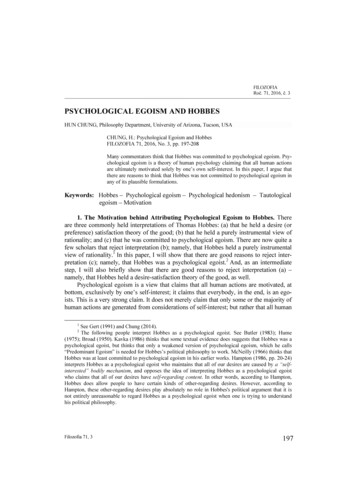
Transcription
FILOZOFIARoč. 71, 2016, č. 3PSYCHOLOGICAL EGOISM AND HOBBESHUN CHUNG, Philosophy Department, University of Arizona, Tucson, USACHUNG, H.: Psychological Egoism and HobbesFILOZOFIA 71, 2016, No. 3, pp. 197-208Many commentators think that Hobbes was committed to psychological egoism. Psychological egoism is a theory of human psychology claiming that all human actionsare ultimately motivated solely by one’s own self-interest. In this paper, I argue thatthere are reasons to think that Hobbes was not committed to psychological egoism inany of its plausible formulations.Keywords: Hobbes – Psychological egoism – Psychological hedonism – Tautologicalegoism – Motivation1. The Motivation behind Attributing Psychological Egoism to Hobbes. Thereare three commonly held interpretations of Thomas Hobbes: (a) that he held a desire (orpreference) satisfaction theory of the good; (b) that he held a purely instrumental view ofrationality; and (c) that he was committed to psychological egoism. There are now quite afew scholars that reject interpretation (b); namely, that Hobbes held a purely instrumentalview of rationality.1 In this paper, I will show that there are good reasons to reject interpretation (c); namely, that Hobbes was a psychological egoist.2 And, as an intermediatestep, I will also briefly show that there are good reasons to reject interpretation (a) –namely, that Hobbes held a desire-satisfaction theory of the good, as well.Psychological egoism is a view that claims that all human actions are motivated, atbottom, exclusively by one’s self-interest; it claims that everybody, in the end, is an egoists. This is a very strong claim. It does not merely claim that only some or the majority ofhuman actions are generated from considerations of self-interest; but rather that all human1See Gert (1991) and Chung (2014).The following people interpret Hobbes as a psychological egoist. See Butler (1983); Hume(1975); Broad (1950). Kavka (1986) thinks that some textual evidence does suggests that Hobbes was apsychological egoist, but thinks that only a weakened version of psychological egoism, which he calls“Predominant Egoism” is needed for Hobbes’s political philosophy to work. McNeilly (1966) thinks thatHobbes was at least committed to psychological egoism in his earlier works. Hampton (1986, pp. 20-24)interprets Hobbes as a psychological egoist who maintains that all of our desires are caused by a “selfinterested” bodily mechanism, and opposes the idea of interpreting Hobbes as a psychological egoistwho claims that all of our desires have self-regarding content. In other words, according to Hampton,Hobbes does allow people to have certain kinds of other-regarding desires. However, according toHampton, these other-regarding desires play absolutely no role in Hobbes's political argument that it isnot entirely unreasonable to regard Hobbes as a psychological egoist when one is trying to understandhis political philosophy.2Filozofia 71, 3197
actions – including the ones that apparently seem to be acts of benevolence as well asthose acts that seemingly stem from one’s moral conviction – are ultimately motivatedsolely by a concern for one’s own exclusive personal good.The major reason why so many people tend to attribute psychological egoism toHobbes comes from the following passages:.of the voluntary acts of every man the object is some good to himself (Hobbes, Leviathan, XIV, 8).For no man giveth but with intention of good to himself, because gift is voluntary,and of all voluntary acts the object is to every man his own good. (Hobbes, Leviathan, XV, 16).For Hobbes, an act is voluntary if and only if it proceeds from one’s will.3 We may thinkof “the will” simply as a person’s final intention to perform his/her most preferred courseof action after his/her deliberation concludes.4 So, what the passages above suggest isthat, according to Hobbes, everybody, as a matter of fact, aims for his/her own exclusivepersonal good whenever he/she performs his/her most preferred course of action. As wecan see, this sounds pretty close to psychological egoism.However, psychological egoism is a very extreme let alone a very contestable doctrine. Many people think that it is false, for good reasons. So, to the very extent thatHobbes’s political philosophy relies on psychological egoism, we can say that it is basedon a very weak foundation. If there is a way to build up Hobbes’s political philosophyfrom a less contestable theory of human psychology without relying on psychologicalegoism, I believe that this will significantly bolster the general plausibility of Hobbes’spolitical philosophy. This is the aim of this paper. That is, in this paper, I will argue thatHobbes was not actually a psychological egoist in any plausible interpretation of thisdoctrine.2. What is Psychological Egoism? Some Clarifications. So, what is psychological egoism? Here is psychological egoism stated in its most general form:[Psychological Egoism]: Everybody is ultimately motivated at bottom solely byhis/her self-interest.There are some things that we need to get clear about in order to understand psychological egoism properly.First, psychological egoism is a doctrine about people’s ultimate or most basic motivations for action. It intends to provide an answer to the question: “Why did X act in thatway?” According to psychological egoism, there is a unique answer to all such questions:namely, “Because it was in X’s own interest to do so.”Psychological egoism does not deny that people can sometimes act in seemingly be3“For a voluntary act is that which proceedeth from the will.” (Hobbes, Leviathan, VI, 53)“In deliberation, the last appetite or aversion immediately adhering to the action, or to the omission thereof, is that we call the WILL.” (Hobbes, Leviathan, VI, 53)4198
nevolent ways. It also does not deny that people can point to certain altruistic reasons toexplain their seemingly benevolent actions. What psychological egoism denies is thatthose altruistic reasons were what really or ultimately motivated such people. Accordingto psychological egoism, regardless of whether one is consciously aware of it or not,one’s actions even those actions that are seemingly benevolent are ultimately motivated at bottom by one’s own self-interest.5 This leads to our next characteristic.Second, one doesn’t necessarily have to be consciously aware of the fact that one isultimately motivated by one’s self-interest in order for one's actions to qualify as manifestations of psychological egoism. It might be true that everybody is, in fact, ultimatelymotivated by self-interest, but such motivation might be so deeply embedded within people’s subconscious states that not everybody is consciously aware that his/her actions aremotivated in this way. Or people might simply be what Gauthier calls “self-maintainingengines” 6 who are just programmed (like machines) to pursue their own self-interestswithout always being consciously aware that they are motivated in this way. Psychological egoism would still be true if either one of these two doctrines (or a combination of both)are universally true. This means that psychological egoism has more to do with the underlying psychological mechanism rather than the motivational contents of one’s desires andactions.Third, psychological egoism is not a doctrine of achievement. Although it claims thateverybody is ultimately motivated by one’s own exclusive self-interest, it does not claimthat everybody (or even most people) actually succeeds in achieving their own selfinterest. This is something that is not that hard to understand if one thinks about the difference between ‘mere attempt’ and ‘actual achievement’.Such failure to achieve one’s self-interest usually occurs when one has one or morefalse beliefs. For instance, suppose that one is motivated to promote one’s physical health(which is, intuitively, a major component of one’s self-interest), and, thereby, regularlytakes a herbal medicine, which is scientifically proven to be carcinogenic, by falsely believing that the herbal medicine possesses some mysterious powers that contributes tolongevity. In such case, one is not really achieving one’s best self-interest; quite the contrary. Nonetheless, this does not change the fact that one was primarily motivated byone’s self-interest. So, such example is not a counter example to psychological egoism.Fourth, psychological egoism is a descriptive theory of human psychology; not anormative theory of human psychology. It claims that it is a matter of fact that all humanmotivations are ultimately based on one’s exclusive self-interest; not that people’s motivations should be ultimately based on their exclusive self-interest. There is a standard name5Drawing from contemporary psychological learning theories (such as that of Hull and Skinner),in one of his earlier papers, Michael Slote suggests that there could be an empirical basis for psychological egoism such that all higher-order drives and motives (e.g. altruistic and benevolent motives) arefunctionally dependent on a certain number of basically “selfish” unlearned primary drives and motivesSee Slote (1964).6See Gauthier (1969: 21).Filozofia 71, 3199
for the latter type of doctrine which is strictly normative: ethical egoism. Ethical egoismclaims that, generally speaking, people should promote their own exclusive self-interestmore than anything else.The purpose of this section is to see whether Hobbes was a psychological egoist, notwhether Hobbes was an ethical egoist. I want to deny that Hobbes was a psychologicalegoist, or at least, psychological egoism is not needed for his political philosophy. I takeno stance on whether Hobbes was an ethical egoist.3. Was Hobbes a PsychologicalEgoist? As we have seen, psychological egoism generally claims that allhuman actions are ultimately motivated by one’s self-interest. Differentpeople have different conceptions ofin what a person’s self-interest consists. And this, in turn, results inslightly different versions of psychological egoism.3.1. Was Hobbes a Psychological Hedonist? One version of psychological egoism interprets a person’sgood in purely hedonistic terms. Thisis a version that is usually known aspsychological hedonism. Psychological hedonists define a person’s goodas the experience of pleasure and theabsence of pain. In fact, they goslightly further than this; according topsychological hedonism, the experience of pleasure and the absence of pain exhaust a person’s good or well-being.So, self-interest, according to psychological hedonism, is none other than the experience of pleasure and absence of pain. From this, psychological hedonism can be characterized as follows:[Psychological Hedonism]: All human actions are motivated ultimately by one’sself-interest; namely, by a basic desire to experience pleasure and to avoid pain.There are some people who have understood psychological egoism in this particular waywhen they attributed psychological egoism to Hobbes.7 However, as long as one’s theory7This seems to be the view of F. S. McNeilly in McNeilly (1966), where he argues that Hobbeswas not a psychological egoist after he had wrote Leviathan because, unlike Hobbes’s earlier works,pleasure no longer plays a central role in his philosophy. Jean Hampton also seems to be interpreting200
of the good (or well-being) allows the possibility of things other than the experience ofpleasure and the absence of pain to constitute or contribute to one’s self-interest, one neednot be committed to psychological hedonism in order to be committed to psychologicalegoism; one can think that all human actions are ultimately motivated by one’s own selfinterest even if one thinks that not all human actions are motivated by a basic desire toexperience pleasure and avoid pain.There are grounds to think that Hobbes was not a psychological hedonist. ForHobbes, a person’s ultimate self-interest consists in securing his/her long-term selfpreservation.Moreover, the greatest of goods for each is his/herown preservation. For nature is soarranged that all desire good for themselves. Insofar as it is within their capacities, itis necessary to desire life, health, and further, insofar as it can be done, security offuture time. (Hobbes, De Homine, XI, 6, emphasis added)Note that actions that best secures one’s prospects for long-term self-preservation neednot be pleasurable. For example, exercising regularly might be a good way to maintainphysical health, but exercise is not always a pleasurable thing to do even when it is obvious that it would make the person healthier.Furthermore, it is clear that Hobbes did not think that the fact that somebody is experiencing pleasure, by itself, guarantees that the person is achieving something that istruly good for him/her. According to Hobbes, there exists people who experience intensepleasure by conquering and having superior power over other people; namely, the gloryseekers.8 However, Hobbes emphatically denies that these glory-seekers are people whoare seeking what is truly advantageous for them; 9 which is their long-term selfpreservation. In fact, he calls this type of people “mad.”10So, not only did Hobbes not think that the experience of pleasure and the absence ofpain exhausts a person’s self-interest, but he also did not think that pursuing pleasure canalways be regarded as a case of pursuing one’s real self-interest. Therefore, we can at thevery least say that Hobbes was not a psychological hedonist. However, this isn’t yet sufficient to show that Hobbes was not a psychological egoist, since it might still be the casethat Hobbes thought that all human actions are ultimately motivated by a basic desire toHobbes as a psychological hedonist when she claims that Hobbes is committed to the view that all of ourdesires are ultimately produced by pleasure-producing and pain-avoiding physical mechanisms. Hampton thinks that Hobbes is not committe
For no man giveth but with intention of good to himself, because gift is voluntary, and of all voluntary acts the object is to every man his own good. (Hobbes, Levia-than, XV, 16). For Hobbes, an act is voluntary if and only if it proceeds from one’s will.3 We may think of “the will” simply as a person’s final intention to perform his/her most preferred course of action after his/her .
